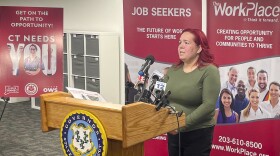Hiring an employee is an expensive proposition. Workers' compensation, social security and other expenses can run thousands of dollars a year, so it's no surprise that companies often try to reduce expenses keeping workers off the payroll, calling them independent contractors instead.
But sometimes they do so in violation of state law. And in a new report, State Auditor Doug Hoffer says the state isn't doing enough to stop a practice known as "misclassification."
There's a big difference between an independent contractor and an employee. Workers wrongly classified as the former lose out on all the benefits and protections that come with gainful employment, and also have to pay the social security and Medicare taxes normally covered by employers.
Hoffer says the practice of misclassification has negative impacts on people other than the worker.
"If you're an employer who's playing the game by the rules and you're bidding on a project where some of the opposition does not, you're at a disadvantage," Hoffer says.
But Hoffer says the government department responsible for identifying misclassification, and penalizing the companies that commit it, isn't doing enough to crack down on offenders. And he says poor data collection, misguided auditing practices and general lack of enforcement at the Vermont Department of Labor might be exacerbating the problem in Vermont.
"The systems in place to collect information which would allow them, the federal government and the Legislature to evaluate their performance are not producing reliable data. That's a problem," Hoffer says.
The lack of reliable data, according to Hoffer, makes it difficult to know how well Vermont is or is not doing when it comes to cracking down on companies that minimize costs and paperwork by classifying employees as independent contractors.
Commissioner of Labor Annie Noonan says she doesn't disagree.
"I think that we need to have better data system," Noonan says. "The auditor's recommendation on that is correct."
Hoffer says other problems include impossibly large caseloads for Department of Labor investigators, and an apparent lack of follow-through on cases that have been opened.
"We found that there were 73 investigations assigned to a single investigator," Hoffer says. "We also found that there were 134 investigations categorized as active that were assigned to investigators that were no longer employed by the department. And there were 30 cases that started in 2011 that have not been completed."
Noonan says the number of active cases assigned to non-existent investigators is somewhat inflated, since many will be ready for closure pending the finalization of paper work. She says long-term illness and other staffing issues have complicated operations at the workers compensation unit where the problems were identified.
"You try to cover the work as best you can, but when somebody is out for a long, long period of time, and we only have limited numbers of auditors in the worker-comp division, it's not always possible to assign all of the case work that was potentially open," Noonan says.
Hoffer says the department could maximize its limited resources by targeting misclassification audits on industries in which companies are statistically more likely to be out of compliance. Hoffer says targeted audits are considered best practice by the U.S. Department of Labor.
"And for some reason thy have resisted going in that direction, even though the feds have produced reports showing that states that do targeted work in the field have much better return," Hoffer says.
Noonan says the randomized approach to audits favored by her department is a sound one.
"So I think that the way that the Department of Labor does it is fair to the Vermont employer community, and yet we still protect the Vermont workforce," Noonan says.
Hoffer's report also says there's more that government agencies could do to make sure contractors hired by the state aren't misclassifying workers.
Copyright 2015 Vermont Public Radio





